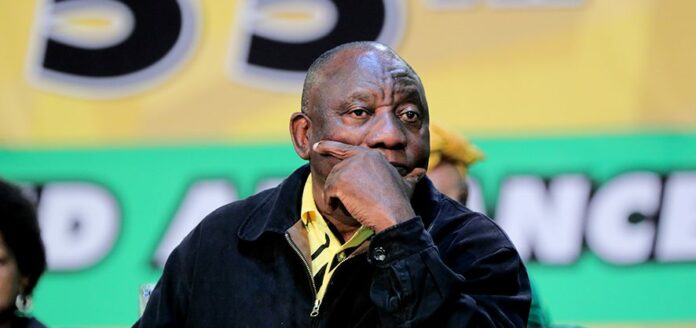There has been a growing political mutiny against ANC President Cyril Ramaphosa in a manner that suggests that this is the beginning of the end of him as head of state.
The open criticism of a sitting head of state, especially by their own party cadres, at the rate things are going, usually signals that their premature exit from office is a matter of time.
Ramaphosa recently entered his second year of his second term at the helm of the country in the Union Buildings.
His leadership questioned
Never before has there been a chorus of heavyweight political figures from within ANC ranks questioning his leadership of the party and the country like there has been this August.
It gets worse when such criticism, when emerging from outside, comes even from prominent erstwhile cheerleaders for Ramaphosa, such as businessman Bonang Mohale.
So frustrated is Mohale with the state of affairs of the country under Ramaphosa that he went extreme. He suggested that South Africa was a failed state.
But the noise that should worry Ramaphosa the most is the one from within the ANC ranks. And it is intensifying with no end in sight.
This August it starts with outspoken ANC NEC member Andile Lungisa calling for the disbandment of the former liberation movement’s highest decision-making body between conferences, led by Ramaphosa, to be dissolved.
Weakest NEC in ANC history
Lungisa believes this is the weakest NEC in the history of the ANC. And his suggested solution involves interesting characters — former ANC President Thabo Mbeki, former Deputy President Kgalema Motlanthe, both of whom are respected veterans of the party.
According to Lungisa, he proposed Mbeki and Motlanthe as national convenor and coordinator to hold the fort on an interim basis and prepare to take the party to a fresh national elective conference.
Mbeki is also among those who have upped the ante in bringing into question Ramaphosa’s leadership qualities in his dramatic pulling out of the National Dialogue’s first national convention that was held this month.
Another NEC member, Malusi Gigaba, also publicly voiced his frustrations over the government of national unity (GNU) and other ANC problems, locating the dominance of money in the internal party contests to have its genesis in the 2017 Nasrec conference that elected Ramaphosa to the throne. Read between the lines.
Troubled Police Minister Senzo Mchunu, who is also an NEC member, also voiced his concerns over a dying ANC under Ramaphosa’s stewardship.
Senzo Mchunu enters fray
Just like Mohale, Mchunu is a known ally of Ramaphosa who ran under his slate during the Nasrec 1 elective conference. And he was known to be his preferred candidate for a successor until celebrity cop Lt-General Nhlanhla Mkhwanazi spoilt the party.
Another former Ramaphosa political ally, ex-Foreign Affairs Minister and ANC veteran Naledi Pandor is the latest to join the chorus. She took a veiled swipe at the president for asking questions instead of providing solutions.
With this pattern, the anti-Ramaphosa wave does not appear like it is going to stop anytime soon. Despite Luthuli House chief induna, secretary-general Fikile “Vutha” Mbalula, frantically trying to put out the fires.
If history is anything to go by, once political mutiny against a sitting ANC president in their second term starts, it never ceases until they fall.
Mbeki and another former ANC president, Jacob Zuma, know the story too well.
Following in Mbeki, Zuma steps
Mbeki’s problems started when he axed Zuma as deputy president of the country in 2005. This was a fortnight before the ANC’s national general council (NGC) in June of that year.
At that NGC, when Ambassador Nathi Mthethwa raised the Zuma matter, it started a two-year-long wave after wave offensive against Mbeki’s stronghold on power.
From that point, it was open season. Tripartite alliance leaders constantly accused Mbeki of being aloof and abusing the state apparatus to pursue his political opponents.
Following the sustained political rebellion, in 2007, Mbeki fell as ANC president when he got defeated by Zuma at the Polokwane elective conference.
Months later, he was pushed out of the Union Buildings prematurely as head of state. He exited months before the natural end of term the following year.
Another political mutiny
Zuma too, had his chokehold on political power eaten piecemeal like an elephant through consistent political mutiny by senior alliance leaders.
His gradual fall also took more than two years to reach the tipping point. It started in December 2015 after his infamous sacking of finance minister Nhlanhla Nene and appointing Des van Rooyen, whom he was to fire barely a week later, and appointing Pravin Gordhan following political backlash.
From that dramatic December, which saw ANC national officials deviating from the norm and slamming their leader publicly, Zuma was never to know peace.
In December 2017 at Nasrec 1, although Zuma was not contesting, a candidate he endorsed — Dr Nkosazana Dlamini-Zuma — lost to Ramaphosa.
The writing was on the wall that Zuma was finished. And indeed two months later, what befell Mbeki visited him when he was recalled by the ANC as head of state. With more than a year left to finish the term.
History repeating itself
As the old adage goes, history has a way of repeating itself more often than not.
The growing voices against Ramaphosa’s administration in the State and the ANC are but the beginning of a seemingly inevitable fall. This with the ANC’s next elective conference billed for December 2027 and the NGC scheduled to take place in three months’ time.
It is, however, worth noting that his circumstances are far different from Mbeki and Zuma’s. The two reigned during an ANC majority government. Ramaphosa is at the mercy of the multi-party GNU arrangement in which the ANC is the big brother. Be that as it may, only time will tell.



